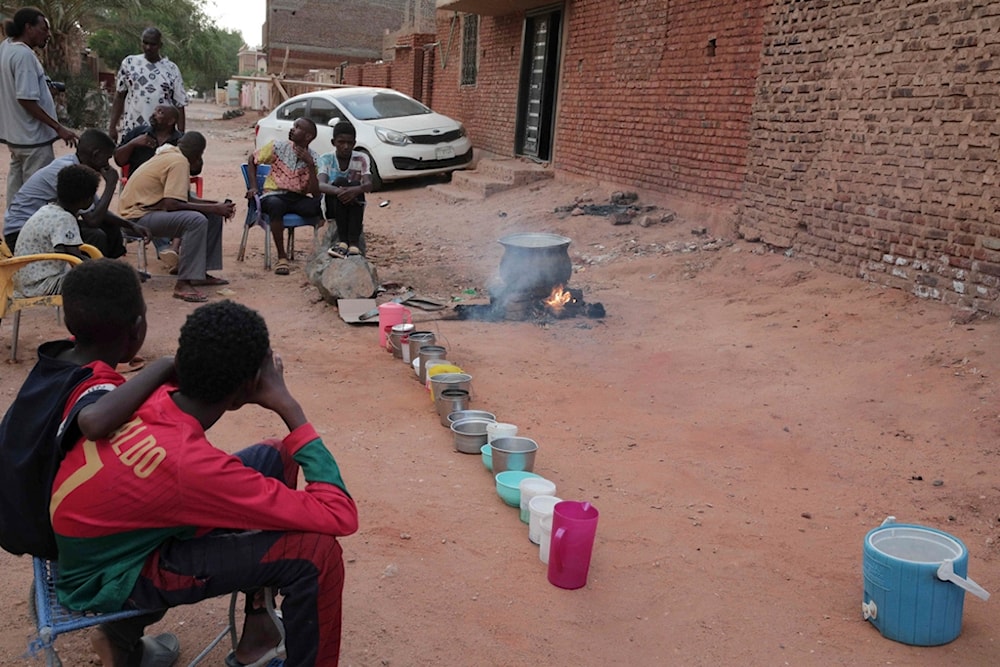Sudan's army, paramilitary RSF using starvation as weapon: UN experts
The experts highlight that "the extent of hunger and displacement we see in Sudan today is unprecedented and never witnessed before."
-

People prepare food in a Khartoum neighborhood, on Friday, June 16, 2023. (AP)
United Nations human rights experts have accused Sudan’s warring factions of weaponizing starvation amid rising fears of imminent famine in the nation.
Sudan descended into chaos in April last year when tensions between the country’s military and the paramilitary Rapid Support Forces (RSF) erupted into open conflict in the capital, Khartoum, and other regions.
In the 14 months of fighting, more than 14,000 people have been killed and 33,000 others have been injured, according to UN figures, though rights activists suggest the toll could be much higher.
Widespread reports of sexual violence and other atrocities have surfaced, with rights groups labeling these acts as war crimes and crimes against humanity. The conflict has created the world’s largest displacement crisis, forcing over 11 million people to flee their homes.
"Both the SAF [Sudanese armed forces] and the RSF are using food as a weapon and starving civilians," pointed out the experts, who are appointed by the UN Human Rights Council but who do not speak on behalf of the United Nations.
They highlighted in a press statement that "the extent of hunger and displacement we see in Sudan today is unprecedented and never witnessed before."
The experts cautioned that famine was imminent, as humanitarian aid has been blocked and the harvest season disrupted by the war. They mentioned that more than 25 million civilians in Sudan, along with those who have fled the country, are being starved and urgently need humanitarian aid.
A report by the Clingendael Institute think tank last month estimated that approximately 2.5 million people in Sudan could die from hunger by the end of September, with around 15% of the population in the Darfur and Kordofan regions likely being the hardest hit.
The independent experts emphasized that local efforts to respond to Sudan’s hunger crisis have been hindered by unprecedented violence and targeted attacks on civil society and local responders, adding that dozens of activists and local volunteers have been arrested, threatened, and prosecuted in recent weeks.
They indicated that "the deliberate targeting of humanitarian workers and local volunteers has undermined aid operations, putting millions of people at further risk of starvation," noting that "local responders are risking their health and lives and working across battle lines."
The experts maintained that "foreign governments providing financial and military support to both parties in the conflict are complicit in starvation, crimes against humanity and war crimes," urging both warring factions to "stop blocking, looting, and exploiting humanitarian assistance."
Elsewhere, they called on the international community to "accelerate humanitarian action," underlining that "it is imperative that the UN, international donors, and states accelerate efforts to alleviate the suffering of millions of Sudanese facing famine."
In recent months, fighting has concentrated around el-Fasher, the capital of the North Darfur state, trapping hundreds of thousands of civilians. According to UN figures, at least 143,000 people have been forced to flee the city over the past three months.
Earlier this month, the UN Security Council demanded that the RSF immediately end its siege of the city, which serves as the military’s last stronghold in the Darfur region.
Read more: UK tries to block critics of UAE's weapon supply to Sudan war: Report

 3 Min Read
3 Min Read








